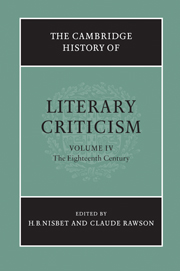Book contents
- Frontmatter
- INTRODUCTION: CRITICISM AND TRADITION
- GENRES
- LANGUAGE AND STYLE
- THEMES AND MOVEMENTS
- 18 Sensibility and literary criticism
- 19 Women and literary criticism
- 20 Primitivism
- 21 Medieval revival and the Gothic
- 22 Voltaire, Diderot, Rousseau and the Encyclopédie
- 23 German literary theory from Gottsched to Goethe
- 24 The Scottish Enlightenment
- 25 Canons and canon formation
- LITERATURE AND OTHER DISCIPLINES
- Bibliography
- Index
- References
22 - Voltaire, Diderot, Rousseau and the Encyclopédie
from THEMES AND MOVEMENTS
Published online by Cambridge University Press: 28 March 2008
- Frontmatter
- INTRODUCTION: CRITICISM AND TRADITION
- GENRES
- LANGUAGE AND STYLE
- THEMES AND MOVEMENTS
- 18 Sensibility and literary criticism
- 19 Women and literary criticism
- 20 Primitivism
- 21 Medieval revival and the Gothic
- 22 Voltaire, Diderot, Rousseau and the Encyclopédie
- 23 German literary theory from Gottsched to Goethe
- 24 The Scottish Enlightenment
- 25 Canons and canon formation
- LITERATURE AND OTHER DISCIPLINES
- Bibliography
- Index
- References
Summary
Ideas about poetry changed almost completely during his time, Sainte-Beuve wrote in 1866: the poetic ideal of a ‘most finished and beautiful work, the most clear and pleasant to read’ had given way to the desire for a poetry offering ‘the greatest latitude to [its] reader to imagine and to dream’. Quoting him Margaret Gilman noted that between the beginning of the eighteenth century and Sainte-Beuve's time ‘the conception of poetry changed from that of embellished statement to “suggestive magic”, to use Baudelaire's phrase’. ‘Merely decorative allegorization’, as Paul de Man pointed out, using the terms of Wordsworth's reproach to Pope, came at the end of the eighteenth century to be seen as inferior to the ‘imaginative use of figural diction. Meanwhile the term imagination steadily [grew] in importance and complexity in the critical as well as in the poetic texts of the period’. A ‘profound change in the texture of poetic diction’, often taking the form of greater concreteness, was paradoxically accompanied by the increasingly metaphorical structure of poetic language and ‘the image – be it under the name of symbol or even of myth – [came] to be considered as the most prominent dimension of the style’.
French literary criticism of the second half of the eighteenth century manifests a tension between, on the one hand, an uncompromising neoclassicism in its most characteristic dogmas and, on the other, frequent expressions of opinion that sound very unclassical. Some of the most original literature of the period is ‘pre-romantic’ in both subject and manner.
- Type
- Chapter
- Information
- The Cambridge History of Literary Criticism , pp. 489 - 521Publisher: Cambridge University PressPrint publication year: 1997



